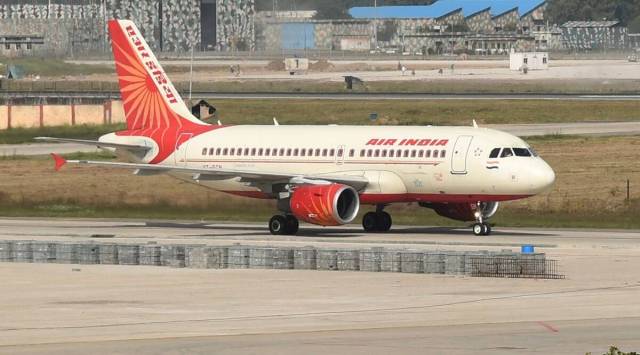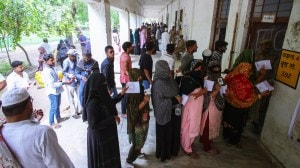- India
- International
Tata Sons wins bid for acquiring national carrier Air India
The Tata Group placed a winning bid of Rs 18,000 crore. Along with the assets, the new owner will also take on around Rs 15,300 crore of debt, Secretary, Department of Investment and Public Asset Management Tuhin Kanta Pandey said.
 Air India has been in losses ever since its merger with domestic operator Indian Airlines in 2007.
Air India has been in losses ever since its merger with domestic operator Indian Airlines in 2007.Tata Sons will regain control of Air India as it takes over 100 per cent of the government’s stake in the national carrier, marking the end of a protracted struggle to sell the airline and the first step in the Centre’s mega privatisation push.
The Mumbai-based conglomerate placed a winning bid of Rs 18,000 crore, of which Rs 2,700 crore will be paid in cash and the remaining Rs 15,300 crore will be the absorbed from the over Rs 60,000 crore debt the airline had as of August 31, 2021.
The government, in 1953, had taken control of the airline from the Tata Group, which founded the carrier as Tata Airlines in 1932.
Talace Pvt Ltd, a unit of Tata Sons, the holding company for the conglomerate, will acquire 100 per cent of Air India, said Secretary, Department of Investment and Public Asset Management, Tuhin Kanta Pandey. “In the next steps, the letter of intent will be issued and the share-purchase agreement will be signed, and the transaction is expected to close by the end of December 2021,” he said.
‘Welcome back, Air India,” tweeted Ratan Tata, Chairman Emeritus, Tata Sons. “While admittedly it will take a considerable effort to rebuild Air India, it will hopefully provide a very strong market opportunity to the Tata Group’s presence in the aviation industry”.

“On an emotional note,” Tata’s statement said, “Air India, under the leadership of Mr J R D Tata had…gained the reputation of being one of the most prestigious airlines in the world. Tatas will have the opportunity of regaining the image and reputation.”
Air India and its affiliate companies had a combined debt of Rs 61,562 crore as of August 31. Of this, the Tatas will take over a debt of Rs 15,300 crore. The remaining Rs 46,262 crore debt will go to Air India Assets Holding Ltd (AIAHL), a special purpose vehicle. Around Rs 14,000 crore of this debt will be retired by the government by monetising some of its assets such as real estate, while the remaining will be infused by the exchequer.
Since 2009-10, the government has pumped in Rs 1.10 lakh crore to support Air India. During 2019-20, the airline incurred an operational loss of Rs 8,743.59 crore. In 2020-21, when the industry was impacted by Covid-19, Air India reported a provisional operational loss of Rs 6,555.66 crore, according to data furnished by the Ministry of Civil Aviation to Parliament.
Civil Aviation Secretary Rajiv Bansal said the bidding conditions provide for the Tatas to retain all employees of Air India for one year from the close of the transaction. They can offer a voluntary retirement scheme (VRS) in the second year.
Air India has 12,085 employees — 8,084 permanent, and 4,001 contractual. In addition, Air India Express has 1,434 staffers. In the next five years, about 5,000 permanent employees will be retiring, he said.
The Tata Group cannot transfer the Air India India brand or logo for five years and thereafter, can do so only to an Indian entity.
The scope of the sale includes 100% of the government’s stake in Air India and 100% of the airline’s shareholding in low-cost airline Air India Express Ltd and 50% in Air India SATS Airport Services Private Ltd.
The financial bids that were placed on September 15 saw the Tata Group outbidding SpiceJet promoter Ajay Singh, who bid in his private capacity. The Ajay Singh consortium bid Rs 15,100 crore.
The government had set a reserve price of Rs 12,906 crore for 100% stake. Representatives of both bidders were called for meetings on two occasions earlier this month, during which the share-purchase agreement was discussed to help them take a long-term view of Air India’s liabilities, and plan the funding accordingly.
On October 4, the decision was ratified by the Air India Specific Alternate Mechanism, a group of ministers headed by Home Minister Amit Shah, that was constituted to take a decide on the airline’s disinvestment. In addition to the home minister, the AISAM comprises Finance Minister Nirmala Sitharaman, Commerce Minister Piyush Goyal and Civil Aviation Minister Jyotiraditya Scindia.
This was the Government of India’s third attempt at selling the national carrier after two unsuccessful tries in 2001 and 2018.
After the second attempt, when not even a single bid was placed for the loss-making airline, the Centre brought Air India back to the table early last year with significant changes in parameters for the sale.
One of the key changes announced was that potential bidders were allowed to place their bids on the basis of enterprise value, which accounts for both equity as well as debt of the company.
The addition of Air India to its aviation portfolio will give the Tata Group a significant leg-up in its international operations, as it gets access to 1,800 international landing and parking slots at domestic airports, and 900 slots at airports overseas, in addition to the 4,400 domestic slots.
This includes routes and slots at prime locations like London and New York, and a wide-bodied aircraft fleet essential for long-haul operations.
The group has evinced interest in acquiring the airline on several occasions earlier, including in 2001 along with Singapore Airlines, but the bid was withdrawn at the last stage.
In 2015, the group launched an airline in a 51:49 joint venture with Singapore Airlines. The group also holds 83.67% stake in the low-cost airline AirAsia India. Industry sources believe that with Air India under its umbrella again, the Tata Group could consolidate its airline operations.
A significant roadblock in this plan — the lack of Singapore Airlines’ waiver for the group to go ahead and acquire Air India — was cleared recently. As of August 2021, the three airlines together had a market share of 26.7% in the domestic air passenger market. Air India is the second placed airline with 13.2% market share, compared to leader IndiGo’s 57% share.
Apr 26: Latest News
- 01
- 02
- 03
- 04
- 05








































